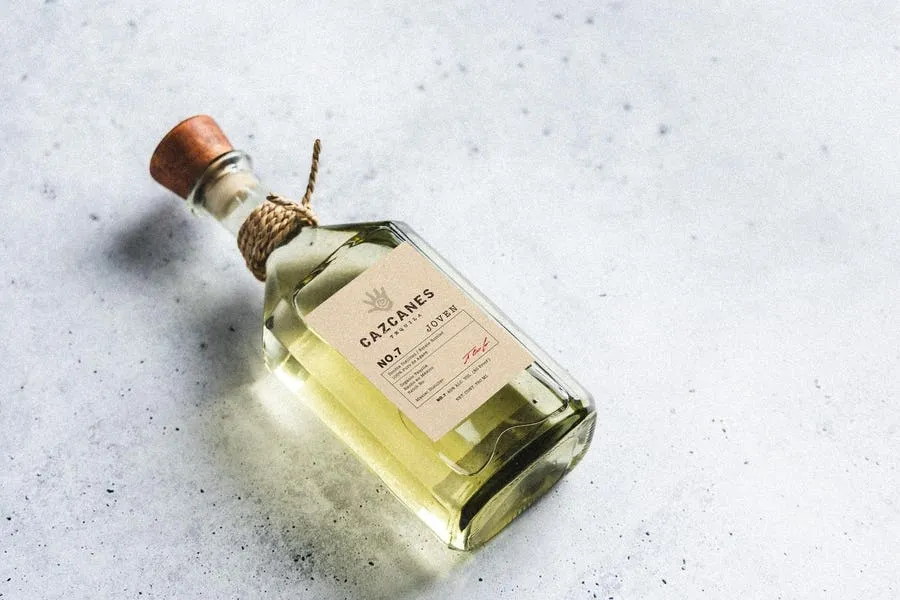Forbes contributors publish independent expert analyses and insights.
When Cazcanes Tequila unveiled a brand-new joven expression ahead of the holiday season in 2021, the limited-edition launch perplexed tequila aficionados.
The drink -- which is comprised of a blend of unaged and aged tequilas -- had a funky aroma that reminded some online content creators of the remnants of blue cheese-stuffed olives found at the bottom of the martini glass. Tasting notes included cinnamon, vanilla, a bit of heat and even butter.
"The flavor profile was insane; people ate it up because it smelled so different," Edwin Dolgopyat, chief operating officer of Cazcanes, tells me during a virtual interview. "In some cases, people said it smelled horrible. But the flavor profile was insane."
Cazcanes is returning to the joven well this fall, launching the Cazcanes No. 7 Joven which is described as agave-forward with layers of vanilla, toasted coconut, baked apple, citrus and caramel. The No. 7 Joven combines 59% blanco, 13% reposado, 26% añejo and 2% extra añejo.
Dolgopyat says the new joven is representative of Cazcanes' evolving approach to innovation.
"As the brand has grown, we have to think now about the general consumer," he said. "How do we release a SKU that is still innovative and interesting, that people don't really understand, yet can be digestible by someone that doesn't know much about agave and can still understand what they're experiencing."
Founded in 2015 and launching its inaugural tequila batch two years later, Cazcanes is now sold across 32 states with a core focus on five markets: California, Nevada, Texas, Florida and the New York-New Jersey region. The brand hired its first dedicated sales team members in 2024, and also hired VPs to oversee sales and marketing. There is now a sales team of 20 full-time employees and brokers at work to get even more distribution.
Cazcanes disclosed that the company posted a 37% increase in the number of nine-liter sold in the first eight months of 2025 compared to the prior-year period. Growth for on-premise accounts, which includes restaurants, bars and hotels, was 96%. Off-premise accounts, which includes liquor and grocery shops, grew 31% over the same period.
Dolgopyat recalled that when he joined Cazcanes as COO in March 2020, just as the start of the COVID-19 pandemic, it became nearly impossible for the brand to build itself on bars and restaurants.
"I would throw a couple of bottles in my backpack and go around LA and try to sell, not even a case -- bottles -- to certain liquor stores for them to at least try to believe in the product," said Dolgopyat.
After the pandemic subsided, Cazcanes was able to invest more on in-person events, including attending food and wine festivals, dinner pairings for small groups and any event that prominently centered on agave, the plant that is used for the production of tequila and mezcal. Cazcanes also leaned on key distributor relationships, including with importer and distributor Winebow, which operates across 16 states, and a newer relationship with Breakthru Beverage to get footholds in Nevada and Dubai.
"Our brand is liquid to lips," said Dolgopyat."You really need to explain what makes Cazcanes special and what makes us different."
With prices that range from $80 per bottle for the No. 7 blanco to $135 for the No. 7 añejo, Cazcanes sits neatly in the "super premium" tier among tequilas. This subsegment has grown at a faster pace than the total category, more than tripling in volume sold in the U.S. from 2014 to 2024, according to data by trade association the Distilled Spirits Council of the United States. Across all price points, tequila's total volume doubled over the course of the last decade.
As an additive-free brand, Cazcanes cannot manipulate taste or aroma with any added sugars or oak extract. While those ingredients are permitted in tequila by Mexican law if under 1% of total liquid weight, Cazcanes said it prefers to focus on a portfolio retains an agave-forward flavor and smell.
Other launches this year include an expression called Nuestras Raíces, which is an agave spirit (though not technically a tequila) and Cazcanes No. 7 Extra Añejo.
The Nuestras Raíces launch highlights how Cazcanes' bigger scale can be beneficial to innovation, Dolgopyat said. When the brand was smaller, it would have been difficult to justify a business decision to innovate beyond tequila.
"Finally, we felt like as the brand has scaled, we have the brand awareness where we can launch something like that," said Dolgopyat. "We have enough storytellers where it would make sense to launch a SKU like that and it would do well."
